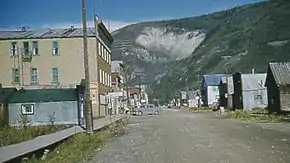
Partizánska Ľupča in Slovakia. Now a village with 1300 inhabitants but in 14th-19th centuries an important mining town with more than 4000. Several houses still have an urban character.

Dawson City, Yukon, Canada, in 1957.
A mining community, also known as a mining town or a mining camp, is a community that houses miners. Mining communities are usually created around a mine or a quarry.
Historical mining communities
Australia
- Ballarat, Victoria
- Bendigo, Victoria
- Kalgoorlie, Western Australia
- Menzies, Western Australia
Austria
Austria-Hungary
Upper Austrio-Hungarian mining towns (Slovakia)
- Göllnitz, today Gelnica
- Jossau, today Jasov
- Nemecká Ľupča, today Partizánska Ľupča
- Schmöllnitz, today Smolník
- Rosenau, today Rožňava
- Zipser Neudorf, today Spišská Nová Ves
- Dilln, today Banská Belá
- Königsberg, today Nová Baňa
- Kremnitz, today Kremnica
- Libethen, today Ľubietová
- Neusohl, today Banská Bystrica
- Pukanz, today Pukanec
- Schemnitz, today Banská Štiavnica
Lower Austrio-Hungarian mining towns (Hungary)
- Ruda, today Rudabánya in Hungary
- Telken, today Telkibánya in Hungary
Bosnia and Herzegovina
Canada
Czechia
(Listed under names given when founded or working as a mining town)
- Abertham, today Abertamy
- Adamstadt, today Adamov
- Adamsfreiheit, today Hůrky
- Bärringen, today Pernink
- Bergreichenstein, today Kašperské Hory
- Bergstadt, today Horní Město
- Bleistadt, today Oloví
- Böhmisch Wiesenthal, today Loučná pod Klínovcem
- Eule, today Jílové u Prahy
- St. Georgenthal, today Jiretin pod Jedlovou
- Goldeck (Mährisch Altstadt), today Staré Město pod Sněžníkem
- Goldenstein, today Branná
- Gossengrün, today Krajková
- Gottesgab, today Boží Dar
- Graupen, today Krupka
- Hartmanitz, today Hartmanice
- Iglau, today Jihlava
- St. Joachimsthal, today Jáchymov
- Johannesthal, today Janov
- St. Katharinaberg, today Hora Svaté Kateriny
- Klostergrab, today Hrob
- Kupferberg, today Měděnec
- Kuttenberg, today Kutná Hora
- Lauterbach (Kaiserwald) (town no longer exists)
- Mies, today Stříbro
- Neustadt a. d. Tafelfichte, today Nové Město pod Smrkem
- Plan, today Planá
- Platz, today Místo
- Platten, today Horní Blatná
- Preßnitz (town no longer exists)
- Rudolfstadt, today Rudolfov
- Schlaggenwald, today Horní Slavkov
- Sebastiansberg, today Hora Svatého Šebestiána
- Sonnenberg, today Výsluní
- Unterreichenstein, today Rejštejn
- Wodnian, today Vodňany
- Zuckmantel, today Zlaté Hory
Finland
Germany
In Germany, a Bergstadt refers to a settlement near mineral deposits vested with town privileges, Bergregal rights and tax exemption, in order to promote the economic development of the mining region.
Baden-Württemberg
Bavaria
Lower Saxony
North Rhine-Westphalia
Saxony
- Altenberg
- Annaberg
- Buchholz
- Berggießhübel
- Bleiberg (near Frankenberg/Sa.) (town no longer exists)
- Brand
- Ehrenfriedersdorf
- Eibenstock
- Elterlein
- Ernstthal
- Freiberg
- Geyer
- Glashütte (Saxony)
- Hohenstein
- Johanngeorgenstadt
- Lengefeld
- Lößnitz
- Marienberg, Saxony
- Neustädtel
- Oberwiesenthal
- Oederan
- Scheibenberg
- Schneeberg
- Schwarzenberg/Erzgeb.
- Thum
- Voigtsberg
- Wolkenstein
- Zschopau
- Zwönitz
Saxony-Anhalt
Thuringia
Hong Kong
Indonesia
- Central Papua Province
Nigeria
Norway
Poland
- Georgenberg (now Miasteczko Śląskie)
- Goldberg, (now Złotoryja)
- Groß Salze, (now Wieliczka)
- Nikolstadt, (now Mikołajowice)
- Salzberg, (now Bochnia)
- Wilhelmstal, (now Bolesławów)
Slovenia
South Korea
United States
Alaska
Arizona
California
Colorado
Idaho
Iowa
Michigan
Minnesota
Montana
- Bannack (ghost town)
- Butte
- Colstrip
- Virginia City
Nevada
New Mexico
South Dakota
Utah
Wisconsin
See also
- Boomtown
- Coal town
- Man camp – temporary housing for resource extraction
- Mission (station)
- Pit village
References
Citations
- Sherman, James E; Barbara H. Sherman (1969). Ghost Towns of Arizona. University of Oklahoma Press. ISBN 0-8061-0843-6. Book features pg. 147 about what is necessary for a settlement to have in order to be considered a "mining town".
Wikimedia Commons has media related to Mining towns.
This article is issued from Wikipedia. The text is licensed under Creative Commons - Attribution - Sharealike. Additional terms may apply for the media files.